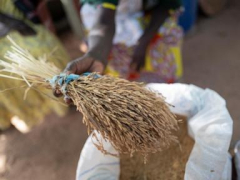ZIGUINCHOR, Senegal — Mariama Sonko’s voice resounded through the circle of 40 women farmers sitting in the shade of a cashew tree. They scribbled notes, brows furrowed in concentration as her lecture was punctuated by the thud of falling fruit.
This quiet village in Senegal is the headquarters of a 115,000-strong rural women’s rights movement in West Africa, We Are the Solution. Sonko, its president, is training female farmers from cultures where women are often excluded from ownership of the land they work so closely.
Across Senegal, women farmers make up 70% of the agricultural workforce and produce 80% of the crops but have little access to land, education and finance compared to men, the United Nations says.
“We work from dawn until dusk, but with all that we do, what do we get out of it?” Sonko asked.
She believes that when rural women are given land, responsibilities and resources, it has a ripple effect through communities. Her movement is training women farmers who traditionally have no access to education, explaining their rights and financing women-led agricultural projects.
Across West Africa, women usually don’t own land because it is expected that when they marry, they leave the community. But when they move to their husbands’ homes, they are not given land because they are not related by blood.
Sonko grew up watching her mother struggle after her father died, with young children to support.
“If she had land, she could have supported us,” she recalled, her normally booming voice now tender. Instead, Sonko had to marry young, abandon her studies and leave her ancestral home.
After moving to her husband’s town at age 19, Sonko and several other women convinced a landowner to rent to them a small plot of land in return for part of their harvest. They planted fruit trees and started a market garden. Five years later, when the trees were full of papayas and grapefruit, the owner kicked them off.
The experience marked Sonko.
“This made me fight so that women can have the space to thrive and manage their rights,” she said. When she later got a job with a women’s charity funded by Catholic Relief Services, coordinating micro-loans for rural women, that work began.
“Women farmers are invisible,” said Laure Tall, research director at Agricultural and Rural Prospect Initiative, a Senegalese rural think tank. That’s even though women work on farms two to four hours longer than men on an average day.
But when women earn money, they reinvest it in their community, health and children’s education, Tall said. Men spend some on household expenses but can choose to spend the rest how they please. Sonko listed common examples like finding a new wife, drinking and buying fertilizer and pesticides for crops that make money instead of providing food.
With encouragement from her husband, who died in 1997, Sonko chose to invest in other women. Her training center now employs o





